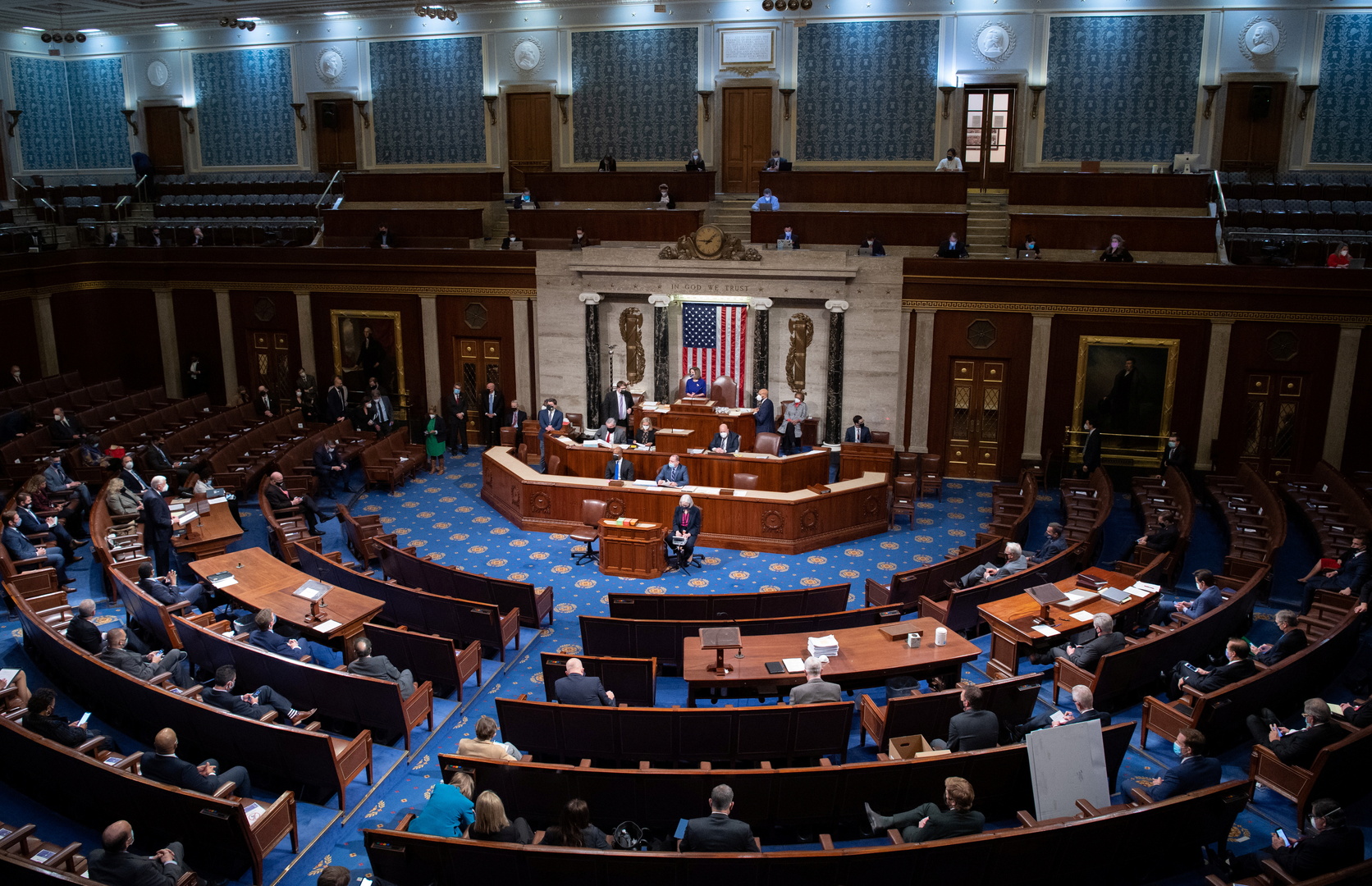The US House of Representatives on Wednesday passed a bill that effectively renews the Caesar Act sanctions and blocks the US from “recognizing or normalizing relations with any government of Syria that is led by Bashar Al Assad”.
The Assad Anti-Normalisation Act passed the House in a 389-32 vote, The National reports.
“With this bill, Congress is sending a message that it remains committed to holding Assad and his backers accountable and ensuring justice for the Syrian people, in the face of creeping normalization with this war criminal,” chairman of the House Foreign Relations Committee Mike McCaul told The National ahead of the vote.
Mohammed Alaa Ghanem – policy chief at the Syria American Council, which has lobbied for the bill – told The National the act is “a second lease on life for Caesar”, because it extends the sweeping 2019 sanctions, set to expire this year, until 2032.
The bill expands the Caesar Act, which included a tough round of sanctions on the Assad regime, to include those providing support to the Syrian People’s Assembly and the Baath Party.
Extending Caesar, Mr Ghanem adds “will also help the United Nations in negotiations because if Caesar is allowed to expire, then it will be a whole new ballgame in Syria and nothing would keep reconstruction in regime-controlled areas under the supervision of the regime from happening”.
In addition, the bill requires developing an inter-agency strategy and an annual report to Congress to counter normalization with the Assad regime.
The legislation was introduced in May on the heels of the Arab League’s decision to reintegrate Syria into the bloc.
The bipartisan bill, spearheaded by the Republican chairman of the Middle East foreign affairs subcommittee Joe Wilson, picked up three additional last-minute co-sponsors on Tuesday, The National confirmed.
Its 52 co-sponsors include members from across political factions and party lines, including progressive Democrats, far-right Freedom Caucus members and moderates.
Brendan Boyle, a Democratic sponsor of the bill and member of the House Syria Caucus, said in a statement: “There should never be any reason to justify normalizing relations with a government that is responsible for the murder of over 600,000 men, women, and children. Tonight, the United States sent a clear and resounding message to Assad and his backers.”
That scope of support shows that standing against the Assad regime “is a matter of consensus”, Mr. Ghanem added.
“This bill sends a message that the resolution to the conflict in Syria can only come through a political agreement where Assad is pushed to the sidelines because as far as the most politically significant country in the world, the largest military in the world, the largest economy in the world, this guy is toast,” Mr. Ghanem said.
UAE restricts U.S. ability to launch retaliatory airstrikes against Iran proxies
The United Arab Emirates (UAE) and other Arab nations are limiting the United States’ use of their military bases to conduct retaliatory airstrikes against Iranian proxies, Politico reported.
This development reflects the complex geopolitical tensions in the Middle East, especially in light of the ongoing conflict between Israel and Hamas. The restrictions have emerged as Arab countries navigate their relationships with both the U.S. and Iran, balancing regional security concerns with domestic and international political considerations.
According to sources, these limitations impact U.S. operations in countries where thousands of American troops are stationed, including the UAE, Kuwait, Oman, and Qatar. The decision to restrict U.S. military actions comes amid the escalating civilian casualties in Gaza due to the Israel-Hamas war, which has intensified scrutiny over Arab states’ support for U.S. military initiatives against Iran-backed forces.
The U.S. has responded by adjusting its military strategies, including deploying additional assets and conducting operations from different locations, such as the use of U.S. Navy F/A-18 fighter jets from aircraft carriers and long-range B-1 bombers for retaliatory strikes. Despite these challenges, the Pentagon maintains that it possesses the capability to defend U.S. forces and execute self-defence operations as necessary, highlighting the ongoing efforts to navigate the complex dynamics of Middle Eastern geopolitics and maintain regional stability.
Invisible scars: Unveiling the mental health crisis at Al-Hol camp in Syria
In a long report, The New Arab highlights how the Al-Hol camp in northeast Syria is experiencing a severe mental health crisis among its residents, primarily due to the compounded effects of violence, displacement, and inadequate healthcare, with Médecins Sans Frontières (MSF) playing a crucial role in providing mental health services to alleviate the psychological distress faced by the camp’s inhabitants.
The Al-Hol camp in northeast Syria often likened to a “massive outdoor prison,” is facing a severe mental health crisis among its detainees, primarily displaced Syrians since 2018. Housing around 40,000 people, many of whom are children born in the camp or displaced during conflicts, the camp’s residents are grappling with the traumatic experiences of violence, loss, and displacement. These conditions have led to widespread cases of post-traumatic stress disorder, depression, and anxiety among the inhabitants.
Médecins Sans Frontières (MSF) has been actively providing mental health services since 2021 to address this crisis, offering both group psychosocial activities and individual therapeutic counselling sessions. Over 10,000 detainees have benefited from these services, highlighting the acute need for mental health and psychosocial support (MHPSS) in the camp. The services are aimed at alleviating the psychological distress caused by the dire living conditions, unmet needs, and the constant threat of violence, which are significant stressors for those living in Al-Hol.
The mental health initiatives also focus on destigmatizing mental health issues within the camp and encouraging open conversations about mental health care, recognizing the importance of support in fostering resilience and well-being among the camp’s residents. Despite the challenging circumstances, these efforts provide a glimmer of hope and a pathway to healing for many affected by the conflict and displacement in Syria.


